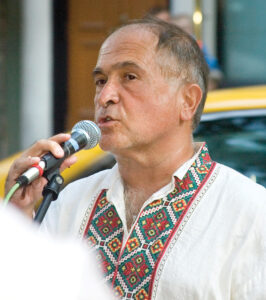The issue of supplying Ukraine with air firepower has reached a level of nonsense rhetoric.
UK Vice President Kamala Harris flew to Poland on March 9 where she found herself careering into political turbulence over this very issue. Aside from the fact that Harris has little, if any, experience in foreign policy or military logistics, her trip may be simply grandstanding, raising more questions than providing answers.
The backdrop was the Polish Government’s decision to transfer Russian-made fighter planes to a U.S. military base in Germany, prior to them being supposedly transferred to Ukrainian pilots. In turn, the U.S. would supply Poland with U.S. made jets with similar capabilities. The rationale was that Ukrainian pilots had been trained to fly the types of planes in Poland’s possession.
On March 6, Secretary of State Antony Blinken asserted that the US had given the green light to the transaction, but the U.S. later demurred, stating it was caught off guard and expressing grave concern that this would be viewed by the Russians as participation of NATO in the war effort.
Certainly there are questions for both the US and Poland. Why fly the Migs to Germany when the distance between Poland and a Ukrainian airfield is less than one hour away? Secondly, how is supplying Migs in terms of war participation, different from supplying Stingers and Javelins?
The Migs would never be used in an offensive manner. Ukraine has no intention of flying over Russian skies and bombing the Kremlin. The Migs would be used to defend Ukrainian skies.
In any event, this matter is taking entirely too much time and there is blatant dis-ingenuity on the part of both the US and Poland. In the meantime, civilians, women and children are being slaughtered. Migs are not a panacea but they make Ukraine’s air defence more competitive and its civilians safer.
The New York Times recently published an opinion piece by one of its most respected long-time columnists and multiple Pulitzer prize winner, Thomas Friedman. He wrote:
“There is only one thing worse than a strong Russia under Putin — and that’s a weak, humiliated, disorderly Russia that could fracture or be in prolonged internal leadership turmoil, with different factions wrestling for power and with all of those nuclear warheads, cybercriminals and oil and gas wells lying around”.
However, what Friedman fails to consider is that Putin is a product of the Russian soul rather than Russia being the product of Putin’s psychosis. Furthermore, Russia is not a monolith and hardly a homogeneous society. There are at least 150 nationalities that make up the Russian Federation and almost all, in one way or another, have been maltreated by the Kremlin.
Russia’s approach to conducting its census and recording nationality is grossly misleading. The customary approach is to enter the home of a family, ask questions in Russian, receive responses in Russian, and upon leaving, record that where a family does not speak Russian, they will by default be counted as Russians. Very few object for obvious reasons.
At a recent rally of Ukrainian Americans at Lafayette Park in front of The White House, one of the speakers – a representative of Free Russia – spoke on behalf of Russians who oppose Putin. When she concluded, I approached her and said “You don’t look Russian. Are you a Buryat?” She confirmed my observation as correct.
Many similar non-Russians in Russia have picked up the mantra of ‘Russians opposed to Putin’. The ethnic Russian population in the country is declining even if the census does not indicate that to be the case. Ethnic Russians average significantly fewer children than other ethnicities, in particular those of the Islamic faith, i.e. Chechen, Buryat, Yakut, etc.
So with all that in mind, consideration should be given to the fact that Putin is relatively isolated. While in the U.S. a war declaration is within the purview of Congress, in Russia there is no real parliament or congress.
In any event, the Russian Duma did not declare this war against Ukraine. Putin declared it himself and called it a military operation. Finding Putin a pathway to end this war and save face is perhaps best left to academic discourse. The better approach would be to find a way to end Putin on, shall we say, a more permanent basis.
Discord in Russia and a struggle for power would be a welcome development; a project for humanity perhaps. I am certain as I write this that there are many considering this option as the only viable solution. A Russia without Putin where 150 ethnic groups would be deciding its future would be a Russian Spring.
When was the last time there was a Spring in Russia?

Author: Askold Lozynskyj
New York Attorney, former president of the Ukrainian Congress Committee of America and the Ukrainian World Congress
